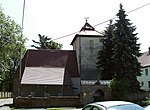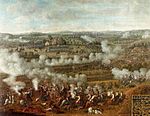The Battle of Rossbach took place on 5 November 1757 during the Third Silesian War (1756–1763, part of the Seven Years' War) near the village of Rossbach (Roßbach), in the Electorate of Saxony. It is sometimes called the Battle of, or at, Reichardtswerben, after a different nearby town. In this 90-minute battle, Frederick the Great, king of Prussia, defeated an Allied army composed of French forces augmented by a contingent of the Reichsarmee (Imperial Army) of the Holy Roman Empire. The French and Imperial army included 41,110 men, opposing a considerably smaller Prussian force of 22,000. Despite overwhelming odds, Frederick managed to defeat the Imperials and the French.
The Battle of Rossbach marked a turning point in the Seven Years' War, not only for its stunning Prussian victory, but because France refused to send troops against Prussia again and Britain, noting Prussia's military success, increased its financial support for Frederick. Following the battle, Frederick immediately left Rossbach and marched for 13 days to the outskirts of Breslau. There he met the Austrian army at the Battle of Leuthen; he employed similar tactics to again defeat an army considerably larger than his own.
Rossbach is considered one of Frederick's greatest strategic masterpieces. He crippled an enemy army twice the size of the Prussian force while suffering negligible casualties. His artillery also played a critical role in the victory, based on its ability to reposition itself rapidly responding to changing circumstances on the battlefield. Finally, his cavalry contributed decisively to the outcome of the battle, justifying his investment of resources into its training during the eight-year interim between the conclusion of the War of Austrian Succession and the outbreak of the Seven Years' War.





